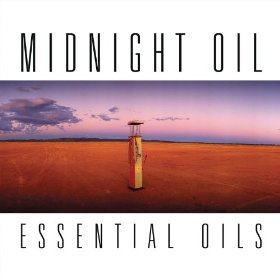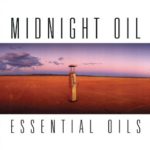
Sony Music/Legacy Recordings
One of the select few bonafide rock and roll bands to flourish in the Eighties, Midnight Oil succeeded into the next decade by brandishing a social conscience as well-honed as their musical savvy. Perhaps because of their unique vantage point as natives of Australia, this tightly-unified group adopted and maintained a unique perspective on the world at large that allowed them a healthy detachment crucial to preserving the impact of their music.
Chosen by the band itself (disbanded now for over a decade), the three-dozen tracks of Essential Oils appear in chronological running order designed to highlight the development of the band instrumentally and politically. It’s a distinction worth mentioning more than once because, as anthemic as The Oils could sound, as on “My Country,” they never stooped to mere rhetoric: their observations were invariably designed as a means to an end, in which the positive change they sought so fervently was mirrored in their own evolution as a band.
Even the earliest songs of Midnight Oil, such as “Run by Night,” illustrate how, even if they were not always eloquent in their instrumental or political statements, they were, at the very least, articulate. The remastering of these recordings, much of it done by the expert Bob Ludwig, serves to accent the variety in the arrangements of these vintage recordings. Driving bass as insistent as Peter Garrett’s carefully enunciated vocals angled through dual guitars that, in later years, contrasted with horns (“Say Your Prayers”) and strings (“The Dead Heart”).
Such embellishments did nothing to prettify The Oils’ music anymore than the increasingly common use of acoustic guitars during tracks such as “In the Valley,” as on “Armistice Day.” Rather, the carefully wrought subtleties mirrored the nuance in the group’s collective political stance: it was a coherent vision for change as remarkable as the integrity of their songs, precisely because the whole band participated in the composition and production of their recordings, from their nascent stages right up through the preparation and release of this double-cd anthology.
Inclusive on every front, Midnight Oil didn’t refrain from craftsmanlike colorations that kept their output as polished as the band was prolific. Indie producer Warne Livesy oversaw the band’s most commercially successful albums, Diesel and Dust and Blue Sky Mining (containing, respectively, “Beds Are Burning” and “Blue Sky Mine”), while Malcolm Burn, his seasoned pedigree enhanced by relocation to New Orleans from Canada (not to mention experience with Daniel Lanois during the period he worked with U2 and Bob Dylan) helped the sextet nurture a well-defined sense of roots in its later years. This cultured approach evolved long after their studio alignments in the early 80’s with Nick Launay, who had shepherded sessions for John Lydon, nee Rotten’s Public Image, as well as the deeply committed British quartet Gang of Four.
All the while, Midnight Oil brought to fruition not just the raging desire to act as credible spokesmen for the disenfranchised that coursed through the punk rock movement, but the more pragmatic activism that arose from that late Seventies insurgency. As passionate fan and essayist David Fricke points out here, Garrett’s forays into political office were no more artifice than the group’s guerilla appearance on the streets of New York in 1990. There was no more a division between this band and their audience than between Midnight Oil’s role as working musicians and concerned citizens of the world.
In the way the group sought to reach and, ultimately, were successful in appealing to both the aesthetic sensibilities and cultural awareness of a world-wide audience, Midnight Oil fully embodied their own sentiments from the aptly titled “Power and the Passion: “…Oh the temper of the times—-sometimes you got to take the hardest line…”



No Comments comments associated with this post